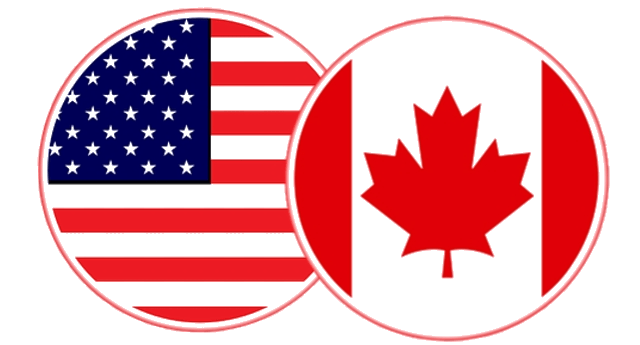Canadians with U.S. Income

You may work in one country and earn income in another, whether remote for an overseas company or by living in the foreign country and working a local job. As a nonresident of another country, you may be responsible for their income taxes. As a United States resident, you are responsible for your worldwide income, but can generally claim the Foreign Earned Income Exclusion or Foreign Tax Credit to avoid double taxation.
Canadian and American Residency
As a Canadian resident, you are taxed based on your residency status, which the Canada Revenue Agency (CRA) determines for you. An a U.S. citizen, you pay taxes on your worldwide income.
- U.S. citizens living and working in Canada are taxed by the CRA. This includes money earned by working for a company based in Canada as well as interest or passive income earned from Canadian stocks, bonds, and/or mutual funds.
- Canadian residents living and working in the U.S. are responsible for U.S. taxes and must file a 1040-NR to compute and pay income taxes.
Gambling Income as a Canadian Resident
If you are a Canadian resident and have had 30% tax withheld from lottery or gambling winnings in the United States, some or all of the tax can be recovered if:
- You also have U.S. gambling losses to offset some or all of the winnings or
- U.S. taxes were withheld from blackjack, baccarat, craps, roulette, or big-6 wheel winnings.
Canadian residents must file a U.S. tax return to get a refund from the IRS (Internal Revenue Service) of U.S. income taxes withheld from lottery winnings or gambling winnings. The US return to be filed is Form 1040NR, US non-resident alien income tax return. You can e-File this form via eFile.com. Start and eFileIT:
Sign up and start now | 1040-NR Instructions
Your lottery winnings, as well as your gambling winnings and losses, will be recorded on Schedule NEC (as part of Form 1040NR) as long as you are not engaged in the trade or business of gambling. Start your return using the link above - otherwise, fill in the forms manually via the instructions below.
- Access Schedule NEC for Form 1040-NR here.
- Instructions: Gambling and lottery winnings for residents of Canada are included on line 10a of Schedule NEC. Proceeds from lotteries and raffles are also included on line 10a, but winnings from blackjack, baccarat, craps, roulette, or big-6 wheel are not included here. Gambling losses are entered on line 10b, with net gambling income (zero if negative) entered on line 10c.
If you have winnings from blackjack, baccarat, craps, roulette, or big-6 wheel, and the casino gave you a Form 1042-S (Foreign Person’s US Source income subject to withholding) showing that tax was withheld, enter these winnings in column d of line 10, with a tax rate of zero. You can claim a refund of the tax.
U.S. Citizens in Canada and Retirement
Canada has an income tax treaty with the U.S. which states that social security benefits paid by Canada to U.S. residents are treated for U.S. income tax purposes as if they were paid under the social security legislation of the United States. As a U.S. resident, you'd enter your Canadian CPP and OAS benefits as though you'd received a Form SSA-1099 from the Social Security Administration.
The U.S.-Canada tax treaty also applies to the Québec Pension Plan (RRQ). Note that the agreement only addresses government-issued Social Security benefits, not money received from private Canadian pensions.
In general, your U.S. based retirement income (IRA, 401, etc.) is taxable in both Canada and by the U.S. You will likely need to file taxes for each country, paying appropriate taxes based on your total income. You can generally still receive Social Security benefits if you move and retire in a foreign country.
You transfer property to your RRIF carrier from an RRSP, a PRPP, an RPP, an SPP, from another RRIF, or from an FHSA and the carrier makes payments to you. The minimum amount must be paid to you in the year following the year the RRIF is entered into. Earnings in a RRIF are tax-free and amounts paid out of a RRIF are taxable on receipt.
See details about Registered Plans for Retirement or RRSPs.
U.S. and Canadian Tax Treaty
If you are a U.S. Citizen working in Canada, a Canadian Citizen working in the United States, or a dual status resident, it may benefit you to know that a tax treaty exists between the two adjacent countries. In general, you should expect to pay income tax for your resident country based on that tax code. You may also be required to file taxes for each country and report your worldwide income. However, the treaty prevents double taxation for those who are citizens of one country and work in the other.
Canadian residents will need to file a 1040-NR to claim this exemption if they earn income from a U.S. source; view the U.S.-Canadian Tax Convention or Treaty.
Read more here about foreign Income, international income earned by US citizens, the Foreign Earned Income Exclusion, and nonresident aliens and taxes.
TurboTax® is a registered trademark of Intuit, Inc.
H&R Block® is a registered trademark of HRB Innovations, Inc.